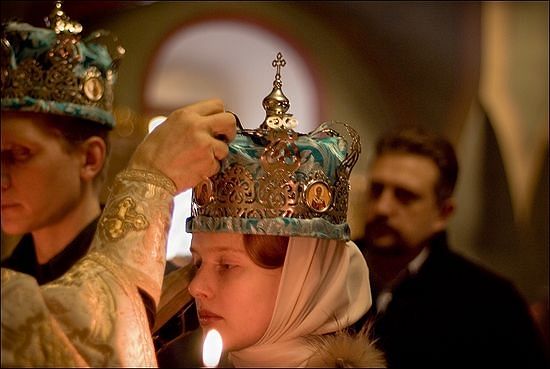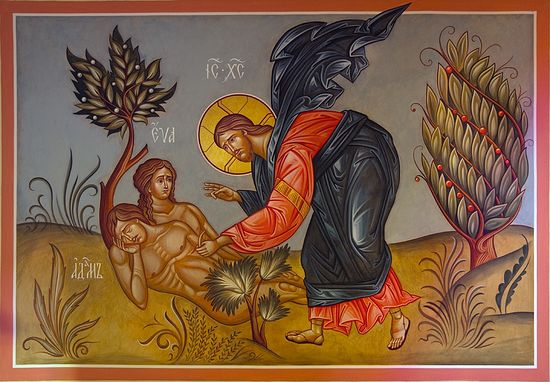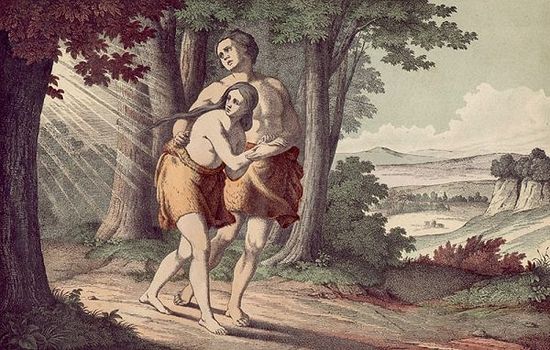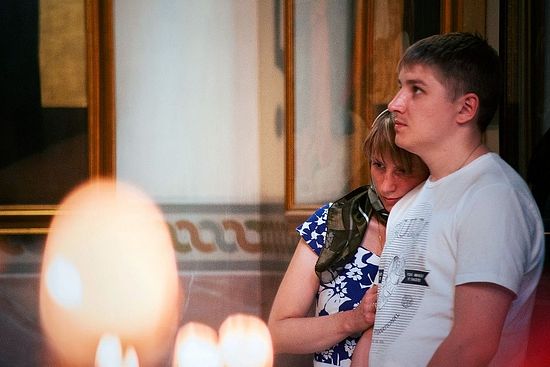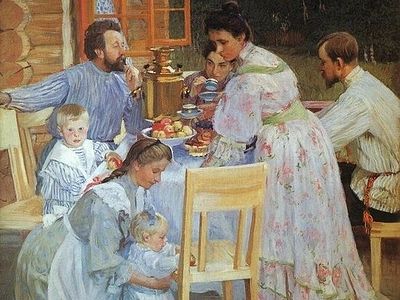“Hearts beat in unison, breathing unites, thoughts merge, and nothing can separate you from your beloved. Adam and Eve probably thought the same, especially considering that their union was concluded by God. But the serpent thought otherwise and easily achieved his goal.” What is the main purpose of marriage, and what must spouses overcome in order to accomplish it?
Entering into marriage: Not why, but what for?
My dears, behold, you have grown and stepped out of your family and into the world. Before every one of us has stood one of the most important questions in life—whether to create a family, to enter into a marital union. But before taking this step, you must answer for yourself the question, “What for?” Not why, but for what purpose should you enter into marriage? The question is not about what pushes you to it (love, loneliness, tradition, etc.), but what goal you want to achieve by creating a marital union. Only having defined this goal will you be able to walk the entire path. Otherwise, any new circumstances in life will throw you from it to this or that side. Your life will transform from a difficult path into aimless wandering; or, to put it otherwise, into licentiousness.1
The word “marriage” (“брак”) is taken from the Greek word “to take” (“брать” in Russian), and the union of husband and wife is fully called a marital union (“брачным союзом”); or, to put it another way, when husband and wife conclude the agreement, which they fully agree upon, not to give themselves to the other, but to take the other to themselves (later I’ll explain why it’s important to take the other). But in order to arrive at this understanding of the marital union, we should start from the very beginning, with the creation of man by God, and his first steps.
God’s creation is completed with the creation of man. God creates Adam and begins His communion with him:
-
through caring for him (planting the Garden of Eden);
-
through the simultaneous establishment of the prohibition (not to eat the fruit of one of the trees);
-
through the involvement of man in the process of creation, giving him the opportunity to name every living creature. In other words, God entrusts to man to define the essence of every animal, infusing them with their individual features according to his free human understanding.
The appearance of woman makes man a man
How long the first God-man communion lasted, we do not know. But at the same time, the Lord saw that the man needed a helper like unto him. And then the Lord creates the first woman, by whose appearance Adam becomes not just the first man, but acquires one more important particularity: he becomes the first husband.
Thus, the creation of woman is at the same time the finishing of Adam’s creation as a man. We often overlook that it’s precisely the appearance of woman that makes man a man. The endless debate about the correct translation of the word “rib” as either one rib, or one side of Adam has no particular significance for us here. Important is the undisputed fact that Eve was created from a part of Adam, inheriting together with his bones, flesh, experience, and knowledge that which he received in communion with God before the creation of his wife.
In this way, by their creation Adam and Eve were united, open and transparent to one another. They were naked one before the other, but were not ashamed of it, precisely because they had nothing to hide. They as yet had no personal experiences and especially no life experience forming their own personal passions.
This nakedness and openness to one another gave Adam the opportunity upon seeing Eve to exclaim, This is now bone of my bones, and flesh of my flesh: she shall be called Woman (Gen. 2:23). The first marital union between man and woman was concluded on the basis of their nakedness of thoughts, desires, and experience, and openness of life before one another.
But the serpent thought otherwise…
When we fall in love, it seems to us that we are in the same condition as Adam and Eve. Hearts beat in unison, breathing unites, thoughts merge, and nothing can separate you from your beloved. Adam and Eve probably thought the same, especially considering that their union was concluded by God. But the serpent thought otherwise and easily achieved his goal. And he so masterfully set his plan in motion, for it is precisely at this time that the basic algorithms of behavior for men and women, not inherent in them before the Fall but becoming an integral part of their human nature afterwards, were laid down.
Thus, the serpent says to the wife, Yea, hath God said, Ye shall not eat of every tree of the garden? (Gen. 3:1). It is a provocation, based on the knowingly deceptive statement in which the snake inconspicuously equates Eve with Adam.
Eve answers the serpent, We may eat of the fruit of the trees… It would seem to be a correct answer, but not completely. In this answer Eve accepts the serpent’s flattering proposition to become equal to Adam, for God did not say it to both of them, but to Adam alone before the creation of Eve. Hence, the correct answer would have been: “God said to Adam, and I know through my husband that…” This is the first crack in marriage and the first injury to the person of Eve, which all women then inherit—susceptibility to flattery (to compliments). Additionally, the desire for functional equality with men, that which we today call feminism, arises in women.
Following this injury there arises the idea of a lie “for the sake of the good.” Eve said to the serpent, God hath said, Ye shall not eat of it, neither shall ye touch it (Gen. 3:3). God did not say not to touch it, neither to Adam nor to Eve. It would seem this is a trifle, but from this moment Eve becomes a hostage to this lie. Trying to repel the serpent, she becomes his accomplice in a lie, and the fissure between her and Adam widens. “Good” lies become another integral feminine trait in marital relationships.
And the serpent to the wife: Ye shall not surely die… your eyes shall be opened, and ye shall be as gods, knowing good and evil (Gen. 3:4, 5). It would seem this would be the very time to call her husband and confer with him about whether to accept the proposition of the serpent, upon which hinges a radical change in not only Eve’s, but Adam’s life. By this time, the certainty that she is equal to her husband is rooted in Eve under the influence of the serpent’s flattery. This defect, having just deformed her original nature, begets in her a new deformation: ignoring her husband in making over-arching decisions in family life. She is convinced that a unilateral decision will be for the good of all, but she is mistaken, just as in the future all women will be mistaken in bypassing their husbands in making family decisions.
Eve eats the forbidden fruit—it came to pass. The erstwhile marriage between her and Adam is already dissolved by her hand. She is no longer the bone of his bone and the flesh of his flesh. She felt above Adam, able now to teach her husband. Now her husband will not be her head, but she will direct him. And they will live not by his experience of communion with God, but by her “wisdom,” received in communion with the serpent. Belittling, up to the total neglect of her husband’s masculinity, is another characteristic entering feminine nature at the moment of the Fall.
Eve is in awe of her experience, and gave also unto her husband with her (Gen. 3:6). This moment is the beginning of the process of the defilement of masculine nature. Adam knew from God that it was forbidden to eat, but did not oppose his wife’s proposal. He displayed an inappropriate feebleness in relation to her, being fascinated by her sensual delight, and losing his masculinity. If Eve had at least tried to fight with the serpent, then Adam could have confidently done that which was suggested to him by his wife. He who was originally created by God and named all living things becomes the mute and spineless executor of his wife’s will. From a leader, man is turned into a slave. The loss of his masculine leadership under his wife’s sensual onslaught becomes one of the main distortions of male nature.
“The woman Тhou gavest me…”
After this distortion of the main male function—leadership—the marriage between Adam and Eve began to fall apart from Adam’s side as well. They became alien one to another. And the eyes of them both were opened, and they knew that they were naked (Gen. 3:7). They saw not only the defacement of one another, but each saw his own defacement, his own differences from the pristine creation of God. Each becomes ashamed of his deformity, and they close off from one another. There is no longer a union in which spouses have nothing to hide from each other, where they can be naked before one another.
The violation of male nature and the marital union did not end there. God, not seeing His beloved ones, calls out for answer not to Eve, but to Adam—to him whom He had placed first, to whom He entrusted Eve. Adam is afraid and won’t come out. Moreover, he is hiding from explaining the relationship, beginning to equivocate. He tries to deflect God’s attention from the main thing that happened and says, I was afraid, because I was naked; and I hid myself (Gen. 3:10). He does not openly confess that he was afraid because he had broken the commandment. Moreover, he directly lies, as he is no longer naked, because they had already made themselves aprons (Gen. 3:7). Man forever loses his previous inherent ability to be honest and open and to bear responsibility for his deeds, but assimilates to himself the serpent’s essence and cunning.
God said to Adam, Hast thou eaten of the tree, whereof I commanded thee that thou shouldest not eat? (Gen. 3:11). Such a simple question, which should receive a simple answer: “Yes.” But instead God hears, The woman whom thou gavest to be with me, she gave me of the tree, and I did eat (Gen. 3:12). Adam effectively renounces his wife as an integral part of himself. She is no longer flesh of [his] flesh, but something foreign: whom thou gavest to be with me. In this very moment, Adam’s masculine nature suffers three new defects, which all his descendants inherit.
-
The refusal to bear responsibility for his wife, for her actions and her decisions;
-
Shifting responsibility for his own mistakes onto his wife and, therefore, a passive attitude to mistakes, and an inability and unwillingness to correct them;
-
The testimony about his wife as a foreign object, not having any similarities to her husband. Men will now publicly emphasize their independence from their wives at work, and in friendly company, and with other women.
This completes the full dissolution of the first marital union between Adam and Eve.
Sentencing and correction
The sentence of God is not a punishment, bringing pain and suffering, but a means for correction, or rather, a path along which man must go in order to uproot in himself newfound characteristics and to receive the possibility of returning to Paradise, and the possibility to again stand before the face of God.
To the woman, who only just gained authority over her husband, the Lord says: and thy desire shall be to thy husband, and he shall rule over thee (Gen. 3:16). Subordination to a man is the most fearful sentence for the woman who only just had risen over her husband in her pride. To return a husband his masculinity, leadership, and strength and to bend under the will of her husband becomes the main task of a woman upon entering in a marital union.
This internal transformation for women is an unbearably excruciating process. Compared with it, the pain of giving birth is not perceived by a woman as a punishment from the Lord. I have gotten a man from the Lord (Gen. 4:1), says Eve, having had her firstborn. It’s precisely in their children that women try to find their consolation, when they turn out to be incapable of fulfilling their main task of recognizing the authority of their husbands over them.
The Lord indicates to man the path to correction, but begins His conversation with Adam by pointing out his guilt: thou hast hearkened unto the voice of thy wife, and hast eaten of the tree, of which I commanded thee, saying, Thou shalt not eat of it (Gen. 3:17). The Lord blames Adam not because he hast eaten of the tree, but because he put the counsel of his wife above the commandment of the Lord. The guilt of Adam, for which he was driven from Paradise, consists in following feminine sensuality instead of following the wisdom of the Lord.
The sentence is simple. Instead of paradisiacal fruits, now man In the sweat of [his] face shalt … eat bread (Gen. 3:19). Together with paradisiacal fruits, free communion with God is taken away. Such a natural, and perhaps even habitual condition of conversation with God for man comes in the overwhelming labor of prayer: Man shall not live by bread alone, but by every word that proceedeth out of the mouth of God (Mt. 4:4). Now the capturing of this true bread has become for husbands the main task of the return to Paradise. Only prayer in the sweat of [his] face gives man the opportunity to hear and comprehend the word of God and to follow it.
Change yourself, not the other
Thus, to return to Paradise, Adam must restore his manhood and strict adherence to the word of God, and Eve must restore her subordinate union with Adam. In other words, the purpose of the union of a man and a woman is to overcome the damages done to male and female nature received at the Fall. They were jointly acquired by Adam and Eve and they must be overcome together in the union of man and woman, in the union in which man takes a woman to himself—as she is, with all her weaknesses and desires.
Taking the woman, the man promises her to pave the way to God for her, like Moses laying the path through the sea and the desert for the Israelite people towards the Promised Land. The woman, taking her husband to herself, despite all his inadequacies, promises to bow her head before him, like Sarah before Abraham. The change of yourself, and not the other, the restoration in yourself, and not in the other, of the first-created human nature is the purpose of the marital union, from Adam and Eve until our day.
